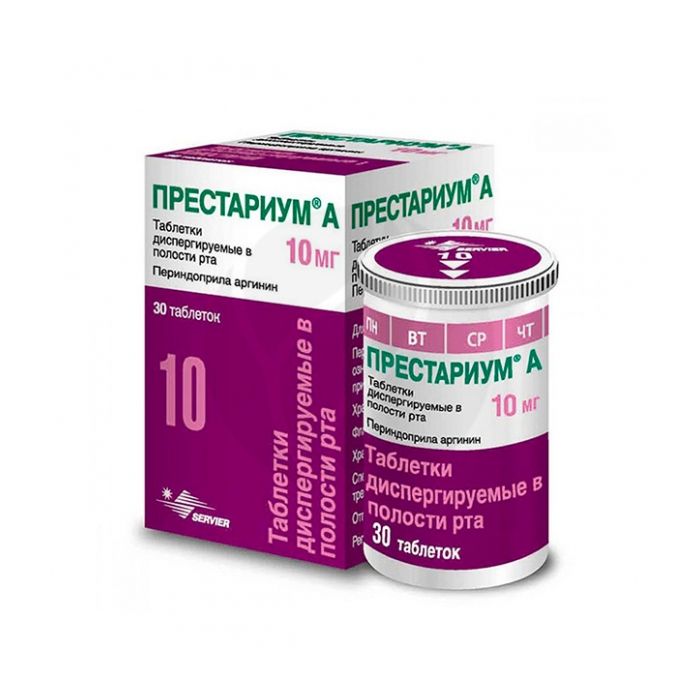Prestarium A dispersible tablets 10mg, No. 30
Expiration Date: 05/2027
Russian Pharmacy name:
Престариум А таблетки диспергируемые 10мг, №30
- arterial hypertension;
- chronic heart failure;
- prevention of recurrent stroke (combination therapy with indapamide) in patients who have suffered a stroke or transient ischemic cerebrovascular accident;
- stable coronary artery disease: to reduce the risk of cardiovascular complications.
Inside, 1 tablet 1 time / day, preferably in the morning, before meals.
The tablet should be put on the tongue and after it disintegrates on the surface of the tongue, swallow it with saliva.
When choosing a dose, one should take into account the peculiarities of the clinical situation (see the section 'Special instructions') and the degree of decrease in blood pressure during therapy. Arterial hypertension PrestariumЃ A can be used both in monotherapy and in combination therapy (see sections 'Contraindications', 'Special instructions' and 'Pharmacological action').
The recommended starting dose is 5 mg once a day.
In patients with pronounced RAAS activity (especially with renovascular hypertension, hypovolemia and / or a decrease in plasma electrolytes, decompensation of chronic heart failure or severe arterial hypertension), a pronounced decrease in blood pressure may develop after taking the first dose of the drug. At the beginning of therapy, such patients should be under close medical supervision. The recommended starting dose for these patients is 2.5 mg 1 time / day. To ensure the specified dosage regimen, perindopril-containing preparations should be used at a dosage of 5 mg in the form of a divisible tablet. If necessary, a month after the start of therapy, you can increase the dose of the drug to 10 mg 1 time / day. At the beginning of therapy with PrestariumЃ A, symptomatic hypotension may occur. In patientssimultaneously receiving diuretics, the risk of arterial hypotension is higher due to possible hypovolemia and a decrease in the content of blood plasma electrolytes.
Care should be taken when using the drug PrestariumЃ A in this group of patients. It is recommended, if possible, to stop taking diuretics 2-3 days before the expected start of therapy with the drug PrestariumЃ A (see the section 'Special instructions'). If it is impossible to cancel diuretics, the initial dose of PrestariumЃ A should be 2.5 mg. To ensure the indicated dosage regimen, perindopril-containing preparations should be used at a dosage of 5 mg in the form of a divisible tablet. In this case, it is necessary to monitor renal function and serum potassium. In the future, if necessary, the dose of the drug can be increased. Diuretics can be resumed if necessary.
perindopril
- a history of angioedema (congenital / idiopathic or associated with previous treatment with an ACE inhibitor reaction)
; -pregnancy; -period of lactation (breastfeeding);
-increased sensitivity to the components of the drug;
-increased sensitivity to other ACE inhibitors;
- lactose deficiency, galactosemia, glucose / galactose malabsorption syndrome (due to the fact that lactose monohydrate is a part of the excipients of the drug).
Pharmacological action
PRESTARIUM A - antihypertensive drug
Indications
- arterial hypertension;
- chronic heart failure;
- prevention of recurrent stroke (combination therapy with indapamide) in patients who have suffered a stroke or transient ischemic cerebrovascular accident;
- stable coronary artery disease: to reduce the risk of cardiovascular complications.
Contraindications -
history of angioedema (congenital / idiopathic or associated with previous treatment with an ACE inhibitor reaction);
-pregnancy;
-period of lactation (breastfeeding);
-increased sensitivity to the components of the drug;
-increased sensitivity to other ACE inhibitors;
- lactose deficiency, galactosemia, glucose / galactose malabsorption syndrome (due to the fact that lactose monohydrate is a part of the excipients of the drug).
Dosage and administration
The drug is administered orally 1 time / day in the morning, before meals.
Side effects
Decreased renal function, acute renal failure, cough, difficulty breathing, bronchospasm, rhinitis, nausea, vomiting, abdominal pain, taste disturbance diarrhea, constipation, loss of appetite, dry mouth, skin rash, pruritus, urticaria, headache , asthenia, dizziness, ringing in the ears, visual disturbances, muscle cramps, paresthesia, sweating, sleep disturbance and sexual dysfunction.
Overdose
Symptoms: a pronounced decrease in blood pressure, shock, electrolyte imbalance (such as an increase in the concentration of potassium ions, a decrease in sodium); renal failure, hyperventilation, tachycardia, dizziness, bradycardia, restlessness, and cough.
Treatment: with a significant decrease in blood pressure, the patient should be transferred to the supine position and the BCC should be replenished immediately, if possible, infusion of angiotensin II and / or intravenous catecholamines should be administered. With the development of persistent severe bradycardia, the use of an artificial pacemaker may be required. Constant monitoring of vital body functions, serum electrolytes and CC is required. Perindopril can be removed from the systemic circulation by hemodialysis. During dialysis, the use of high-flow polyacrylonitrile membranes should be avoided.

